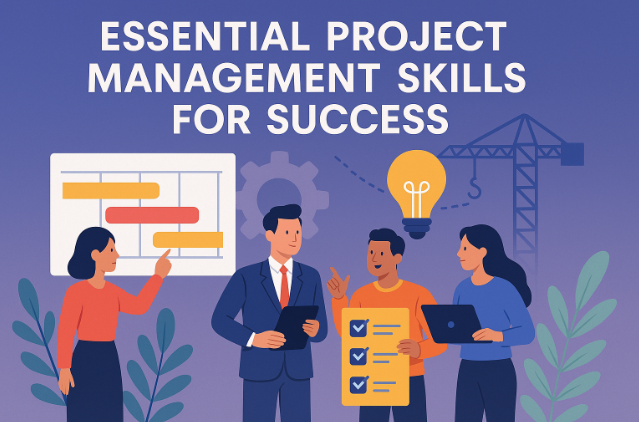Essential Project Management Skills for Success

Project management is a critical function in organizations across industries. Whether overseeing software development, marketing campaigns, construction projects, or business initiatives, a project manager must possess a combination of technical expertise, leadership abilities, and strategic thinking. Here are the essential project management skills necessary for success.
1. Leadership and Team Management
A successful project manager must inspire and motivate their team, ensuring alignment with project goals. Leadership skills help in decision-making, conflict resolution, and guiding the team through challenges while maintaining morale (Turner, 2016).
2. Communication Skills
Clear and effective communication is vital for managing stakeholders, providing project updates, and ensuring team collaboration. A project manager should be adept at verbal, written, and non-verbal communication, as well as active listening (PMI, 2021).
3. Time Management and Scheduling
Effective time management ensures projects stay on track and deadlines are met. Utilizing project management tools like Gantt charts, Kanban boards, and scheduling software helps in planning and prioritizing tasks efficiently (Kerzner, 2017).
4. Risk Management
Every project comes with uncertainties. A skilled project manager identifies potential risks, assesses their impact, and develops mitigation strategies to minimize disruptions (Hillson & Murray-Webster, 2017).
5. Budgeting and Cost Management
Keeping projects within budget is crucial for profitability and sustainability. This requires accurate cost estimation, resource allocation, and continuous monitoring of expenses to prevent financial overruns (Larson & Gray, 2018).
6. Problem-Solving and Critical Thinking
Unforeseen challenges arise in every project. The ability to analyze problems, think critically, and implement effective solutions is a key skill for a project manager (Lock, 2020).
7. Stakeholder Management
A project manager must engage with various stakeholders, including clients, executives, vendors, and team members. Managing expectations, addressing concerns, and ensuring their needs align with project objectives are essential for success (Bourne, 2016).
8. Adaptability and Flexibility
Projects often face changing requirements, unforeseen obstacles, or shifting priorities. A project manager must be adaptable and open to adjusting plans as needed without compromising quality (PMBOK Guide, 2021).
9. Technical Knowledge and Industry Expertise
Understanding the technical aspects of a project ensures effective decision-making and coordination with technical teams. Industry-specific knowledge also helps in addressing project requirements efficiently (Schwalbe, 2018).
10. Negotiation Skills
Negotiation is essential for handling contracts, resolving conflicts, and ensuring resource availability. A good project manager negotiates effectively to maintain project success while balancing stakeholder interests (Lewicki, Barry & Saunders, 2019).
Conclusion
Mastering these essential project management skills enhances efficiency, fosters collaboration, and increases the likelihood of project success. Continuous learning, professional certifications (such as PMP or PRINCE2), and hands-on experience further solidify a project manager’s ability to lead projects effectively in an ever-evolving business landscape.
References
- Bourne, L. (2016). Stakeholder Relationship Management: A Maturity Model for Organisational Implementation.
- Hillson, D., & Murray-Webster, R. (2017). Understanding and Managing Risk Attitude.Gower Publishing.
- Kerzner, H. (2017). Project Management: A Systems Approach to Planning, Scheduling, and Controlling.
- Larson, E., & Gray, C. (2018). Project Management: The Managerial Process.McGraw-Hill.
- Lewicki, R., Barry, B., & Saunders, D. (2019). McGraw-Hill.
- Lock, D. (2020). Project Management.
- (2021). A Guide to the Project Management Body of Knowledge (PMBOK Guide).Project Management Institute.
- Schwalbe, K. (2018). Information Technology Project Management.Cengage Learning.
- Turner, J. R. (2016). Gower Handbook of Project Management.



